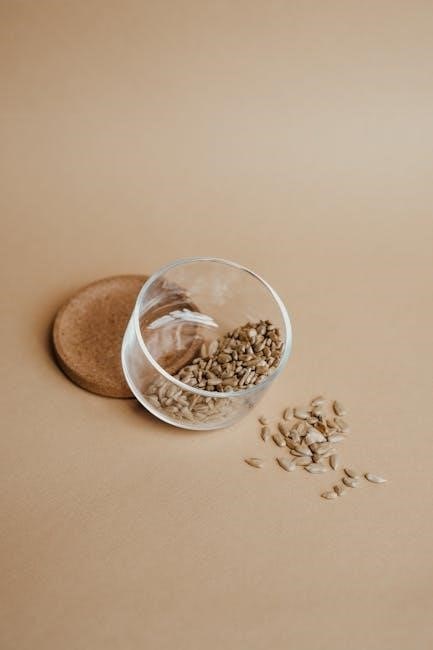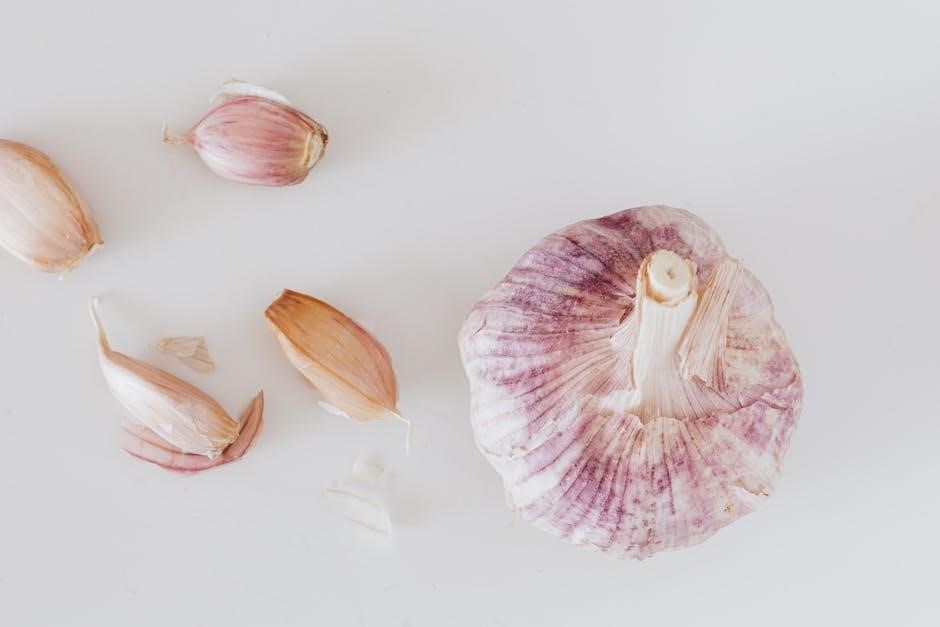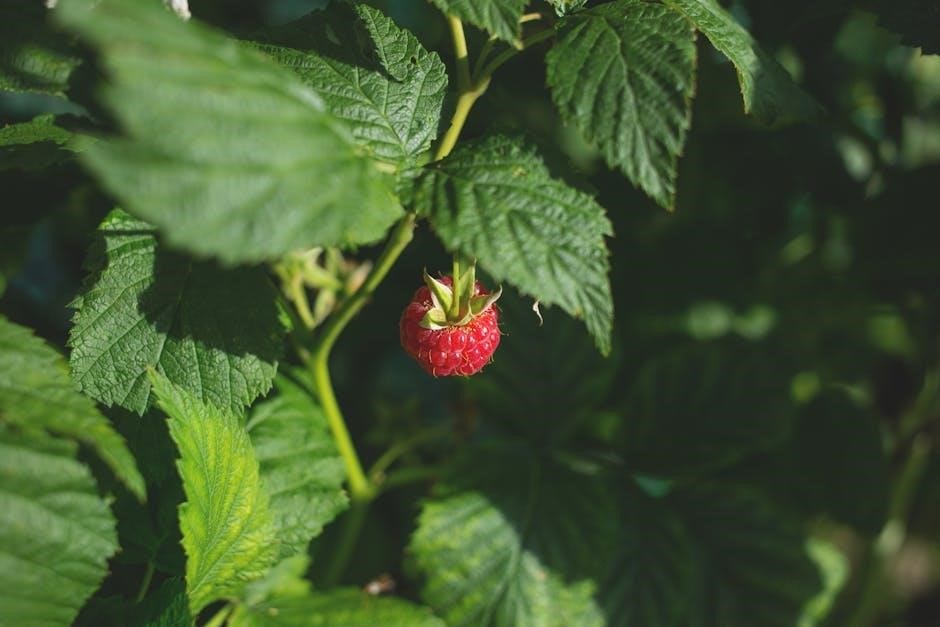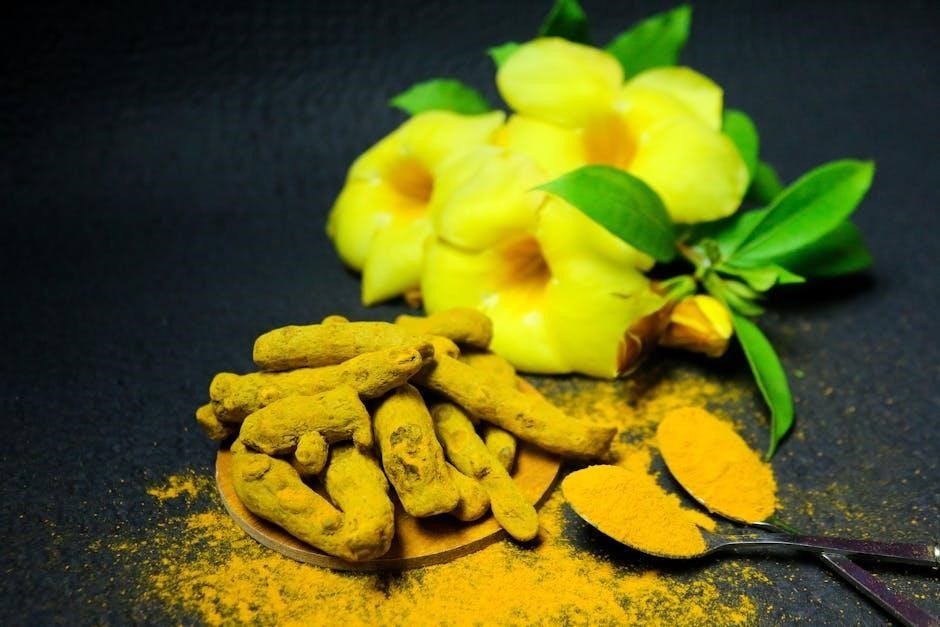Anti-inflammatory foods are a cornerstone of a healthy diet‚ offering natural ways to reduce inflammation. A PDF list highlights key options like berries‚ leafy greens‚ and omega-3 rich fish‚ providing a clear guide to incorporate these nutrients effectively into your meals for improved well-being and chronic disease prevention.
1.1 What Are Anti-Inflammatory Foods?
Anti-inflammatory foods are nutrients-rich options that help reduce inflammation in the body. They include fruits‚ vegetables‚ whole grains‚ and healthy fats. A detailed PDF list highlights specific items like berries‚ leafy greens‚ and fatty fish‚ which are packed with antioxidants and omega-3s. These foods promote healing‚ improve chronic conditions‚ and support overall well-being by naturally combating inflammation.
1.2 The Importance of Reducing Inflammation
Chronic inflammation is linked to various diseases‚ including heart disease‚ diabetes‚ and arthritis. Reducing inflammation through diet can prevent these conditions and improve overall health. Incorporating anti-inflammatory foods‚ as outlined in a PDF list‚ helps naturally combat inflammation‚ promoting long-term well-being and reducing the risk of chronic illnesses by addressing the root cause of many health issues.
Benefits of an Anti-Inflammatory Diet
An anti-inflammatory diet reduces chronic inflammation‚ promoting overall health and lowering the risk of diseases like heart disease‚ diabetes‚ and arthritis‚ while improving energy and well-being.
2.1 How Diet Impacts Inflammation
Diet plays a crucial role in inflammation regulation. Certain foods like refined sugars‚ processed meats‚ and fried foods can trigger inflammation‚ while anti-inflammatory foods‚ such as berries‚ leafy greens‚ and fatty fish‚ help reduce it. A balanced diet rich in antioxidants‚ omega-3 fatty acids‚ and fiber can mitigate chronic inflammation‚ promoting overall health and preventing disease progression.
2.2 Health Conditions Improved by Anti-Inflammatory Foods
A diet rich in anti-inflammatory foods can significantly improve conditions like arthritis‚ heart disease‚ and diabetes. These foods also support brain health‚ reducing the risk of Alzheimer’s and Parkinson’s. Chronic inflammation-related diseases‚ such as autoimmune disorders and certain cancers‚ may benefit from incorporating anti-inflammatory nutrients like turmeric‚ omega-3s‚ and antioxidants‚ promoting overall well-being and symptom relief.
Top Anti-Inflammatory Foods to Include
Include berries‚ dark leafy greens‚ cruciferous vegetables‚ turmeric‚ ginger‚ avocados‚ olive oil‚ fatty fish‚ and nuts. These foods are packed with antioxidants and omega-3s‚ reducing inflammation naturally.
3.1 Fruits: Berries‚ Citrus‚ and Stone Fruits
Berries‚ citrus fruits‚ and stone fruits are rich in antioxidants and polyphenols‚ which help combat inflammation. Berries like blueberries and raspberries are particularly potent‚ while citrus fruits such as oranges and grapefruits provide vitamin C. Stone fruits‚ including cherries and peaches‚ offer anti-inflammatory properties‚ making them excellent additions to an anti-inflammatory diet for overall health benefits.
3.2 Vegetables: Dark Leafy Greens and Cruciferous Vegetables
Dark leafy greens like kale‚ spinach‚ and arugula are packed with antioxidants and anti-inflammatory compounds. Cruciferous vegetables such as broccoli‚ cauliflower‚ and Brussels sprouts contain sulforaphane‚ which supports the body’s detoxification processes. These vegetables are essential in reducing inflammation and promoting overall health‚ making them a cornerstone of an anti-inflammatory diet‚ as highlighted in the anti-inflammatory foods list PDF.
3.3 Spices and Herbs: Turmeric‚ Ginger‚ and Garlic
Turmeric contains curcumin‚ a potent anti-inflammatory compound. Ginger has gingerol‚ which reduces inflammation and aids digestion. Garlic‚ rich in allicin‚ offers both anti-inflammatory and immune-boosting benefits. These spices are easily incorporated into meals and are prominently featured in the anti-inflammatory foods list PDF for their natural healing properties and versatility in various cuisines.
3.4 Healthy Fats: Avocados‚ Olive Oil‚ and Nuts
Avocados are rich in anti-inflammatory monounsaturated fats‚ supporting heart health. Olive oil contains oleocanthal‚ which mimics ibuprofen’s effects. Nuts‚ like walnuts‚ provide omega-3s and antioxidants. These healthy fats are essential for reducing inflammation and are prominently included in the anti-inflammatory foods list PDF for their numerous health benefits and ease of incorporation into daily meals.
3.5 Protein Sources: Fatty Fish‚ Legumes‚ and Lean Meats
Fatty fish like salmon and mackerel are packed with omega-3 fatty acids‚ which are potent anti-inflammatory agents. Legumes‚ such as lentils and chickpeas‚ offer fiber and antioxidants. Lean meats like chicken and turkey provide essential nutrients without the inflammatory effects of red meat. These protein sources are highlighted in the anti-inflammatory foods list PDF for their role in reducing inflammation and promoting overall health.

Foods to Avoid for Reducing Inflammation
Sugary drinks‚ refined carbs‚ processed foods‚ and red meat can trigger inflammation. Limiting these in your diet is essential for reducing chronic inflammation and improving health.
4.1 Sugary and Refined Carbohydrates
Sugary and refined carbohydrates‚ such as white bread‚ pastries‚ and sodas‚ trigger inflammation. They cause rapid spikes in blood sugar‚ promoting insulin resistance and chronic inflammation. Regular consumption can lead to conditions like obesity and diabetes‚ which further exacerbate inflammatory responses. Reducing these in your diet is crucial for maintaining a balanced‚ anti-inflammatory lifestyle.
4.2 Processed and Fried Foods
Processed and fried foods are high in unhealthy fats‚ sodium‚ and preservatives‚ which can trigger inflammation. Regular consumption increases the risk of chronic diseases like heart disease and arthritis. These foods often lack essential nutrients and instead contain pro-inflammatory compounds‚ making them detrimental to an anti-inflammatory diet. Limiting or avoiding them is key to reducing inflammation and improving overall health.
4.3 Red and Processed Meats
Red and processed meats‚ such as bacon‚ sausages‚ and deli meats‚ are linked to increased inflammation. High in saturated fats‚ sodium‚ and advanced glycation end (AGE) products‚ these foods can promote oxidative stress and inflammation. Regular consumption is associated with chronic conditions like arthritis and heart disease‚ making them a priority to avoid in an anti-inflammatory diet.

Creating an Anti-Inflammatory Meal Plan
A well-structured meal plan focuses on balancing nutrient-dense foods to reduce inflammation. Incorporate breakfast options like oatmeal or smoothies‚ grilled fish for lunch‚ and vibrant salads for dinner‚ ensuring variety and adherence to anti-inflammatory principles for lasting health benefits.
5.1 Breakfast Ideas: Oatmeal‚ Smoothies‚ and Avocado Toast
Start your day with anti-inflammatory breakfast options like oatmeal topped with berries and nuts‚ or a vibrant smoothie blending spinach‚ citrus‚ and turmeric. Avocado toast on whole-grain bread offers healthy fats and fiber. These meals provide sustained energy and reduce morning inflammation‚ setting a positive tone for the rest of your day with nutrient-rich‚ delicious choices.
5.2 Lunch and Dinner Ideas: Grilled Fish‚ Salads‚ and Stir-Fries
Grilled fish like salmon or tuna‚ rich in omega-3s‚ pairs well with quinoa or brown rice. Vibrant salads with dark greens‚ colorful vegetables‚ and a olive oil vinaigrette offer refreshing nutrition. Stir-fries with turmeric‚ ginger‚ and cruciferous vegetables provide bold flavors and anti-inflammatory benefits‚ making these meals both satisfying and health-promoting for lunch or dinner.
5.3 Snacks: Nuts‚ Seeds‚ and Fresh Fruits
Nuts like almonds and walnuts‚ rich in omega-3s‚ and seeds such as chia and flax‚ are perfect snacks. Fresh fruits like berries‚ apples‚ and oranges provide antioxidants and fiber. These options are convenient‚ nutritious‚ and help maintain energy levels while supporting an anti-inflammatory diet. They’re also versatile for on-the-go meals or quick bites between main courses.
Beverages for Reducing Inflammation
Herbal teas like green tea and turmeric tea are excellent anti-inflammatory choices. Staying hydrated with water and incorporating vegetable juices supports overall health and reduces inflammation naturally.
6.1 Herbal Teas: Green Tea‚ Turmeric Tea‚ and Ginger Tea
Herbal teas like green tea‚ turmeric tea‚ and ginger tea are potent anti-inflammatory beverages. Green tea contains EGCG‚ a polyphenol that reduces inflammation. Turmeric tea includes curcumin‚ which has strong anti-inflammatory properties. Ginger tea has gingerol‚ known to combat inflammation effectively. Incorporating these teas into your daily routine can enhance your anti-inflammatory diet and promote overall well-being.
6.2 Juices: Vegetable and Berry Juices
Berry juices‚ such as blueberry and raspberry‚ are rich in antioxidants that combat inflammation. Vegetable juices‚ made from leafy greens‚ carrots‚ and tomatoes‚ provide essential vitamins and anti-inflammatory compounds. These juices support immune function and reduce oxidative stress‚ making them a healthy addition to an anti-inflammatory diet when consumed in moderation and without added sugars.
6.3 Water and Hydration
Staying hydrated is crucial for overall health‚ as water aids in flushing out toxins and maintaining cellular function. Proper hydration supports the body’s natural anti-inflammatory processes and helps prevent chronic inflammation. Drinking enough water daily is a simple yet effective way to promote well-being and complement an anti-inflammatory diet.
The Role of Omega-3 Fatty Acids
Omega-3 fatty acids are essential for reducing inflammation and supporting overall health. Found in fatty fish‚ flaxseeds‚ and walnuts‚ they play a key role in cell function and inflammation regulation‚ benefiting heart and brain health while aiding in chronic disease prevention. Incorporating omega-3s into your diet is a vital step in an anti-inflammatory lifestyle. They are a cornerstone of anti-inflammatory nutrition.
7.1 Sources of Omega-3s: Fatty Fish‚ Flaxseeds‚ and Walnuts
Omega-3 fatty acids are abundant in fatty fish like salmon‚ mackerel‚ and sardines‚ which are rich in EPA and DHA. Flaxseeds and walnuts are excellent plant-based sources‚ providing ALA. These foods are essential for reducing inflammation and supporting heart and brain health. Incorporating them into your diet ensures a balanced intake of these vital nutrients‚ critical for overall wellness and disease prevention. A PDF list highlights these options for easy reference.
7.2 Benefits of Omega-3s in Reducing Inflammation
Omega-3 fatty acids are powerful anti-inflammatory agents‚ reducing chronic inflammation that contributes to conditions like arthritis and heart disease. They inhibit inflammatory molecules and promote healing. Regular consumption supports immune function and brain health‚ making them a vital component of an anti-inflammatory diet. A PDF list of omega-3 rich foods provides an easy way to incorporate these nutrients into your meals for optimal benefits.

Anti-Inflammatory Foods List PDF
A handy PDF list of anti-inflammatory foods provides a quick reference guide‚ featuring berries‚ fatty fish‚ and leafy greens‚ to help plan meals and reduce inflammation effectively.
8.1 Summary of the Best Foods to Eat
The best anti-inflammatory foods include berries‚ citrus fruits‚ dark leafy greens‚ and cruciferous vegetables. Incorporate spices like turmeric and ginger‚ healthy fats such as avocados and olive oil‚ and protein sources like fatty fish and legumes. These foods are rich in antioxidants and omega-3s‚ helping to reduce inflammation and promote overall health. Refer to the PDF list for a comprehensive guide;
8.2 How to Download and Use the PDF List
To download the anti-inflammatory foods list PDF‚ click the provided link and save it for easy access. Use this guide to plan meals‚ create shopping lists‚ and track your progress. Print it for a handy reference or share it with others. The PDF is designed to simplify incorporating anti-inflammatory foods into your diet‚ ensuring you never miss essential nutrients and stay on track with your health goals.

Incorporating Anti-Inflammatory Foods into Your Lifestyle
Adopting an anti-inflammatory lifestyle involves mindful meal planning‚ smart grocery shopping‚ and simple swaps. Focus on whole‚ nutrient-rich foods and refer to your PDF guide for inspiration and practical tips to maintain a balanced‚ inflammation-reducing diet.
9.1 Meal Planning and Grocery Shopping Tips
Effective meal planning involves creating a weekly schedule with anti-inflammatory recipes. Grocery shopping tips include stocking up on fresh produce‚ whole grains‚ and healthy fats. Organize your list by categories and refer to your PDF guide for inspiration. Avoid processed foods and opt for seasonal‚ organic options when possible to maximize nutritional benefits and reduce inflammation.
9.2 Easy Swaps for Inflammatory Foods
Replace refined carbs with whole grains‚ sugary snacks with berries‚ and processed meats with grilled fish or legumes. Swap dairy for almond milk and fried foods for roasted alternatives. Use olive oil instead of butter and season with turmeric or garlic for flavor. These simple changes can significantly reduce inflammation and improve overall health‚ as outlined in your anti-inflammatory foods list PDF.
Embracing an anti-inflammatory diet can transform your health. With the anti-inflammatory foods list PDF as your guide‚ start your journey toward reducing inflammation and fostering long-term wellness today.
10.1 Final Thoughts on Anti-Inflammatory Foods
Anti-inflammatory foods offer a natural pathway to better health. Incorporating items from the anti-inflammatory foods list PDF can help mitigate chronic inflammation‚ enhancing overall well-being. By focusing on nutrient-rich choices like berries‚ leafy greens‚ and fatty fish‚ individuals can create a sustainable diet that supports long-term health and vitality. This approach is not just a diet but a lifestyle change.
10.2 Encouragement to Start an Anti-Inflammatory Diet
Embracing an anti-inflammatory diet is a transformative journey toward better health. With the anti-inflammatory foods list PDF as your guide‚ you can easily incorporate nutrient-rich options like berries‚ leafy greens‚ and omega-3 fatty acids. Start small‚ stay consistent‚ and witness the positive impact on your overall well-being. Your body will thank you for this proactive step toward a healthier‚ more vibrant life.
